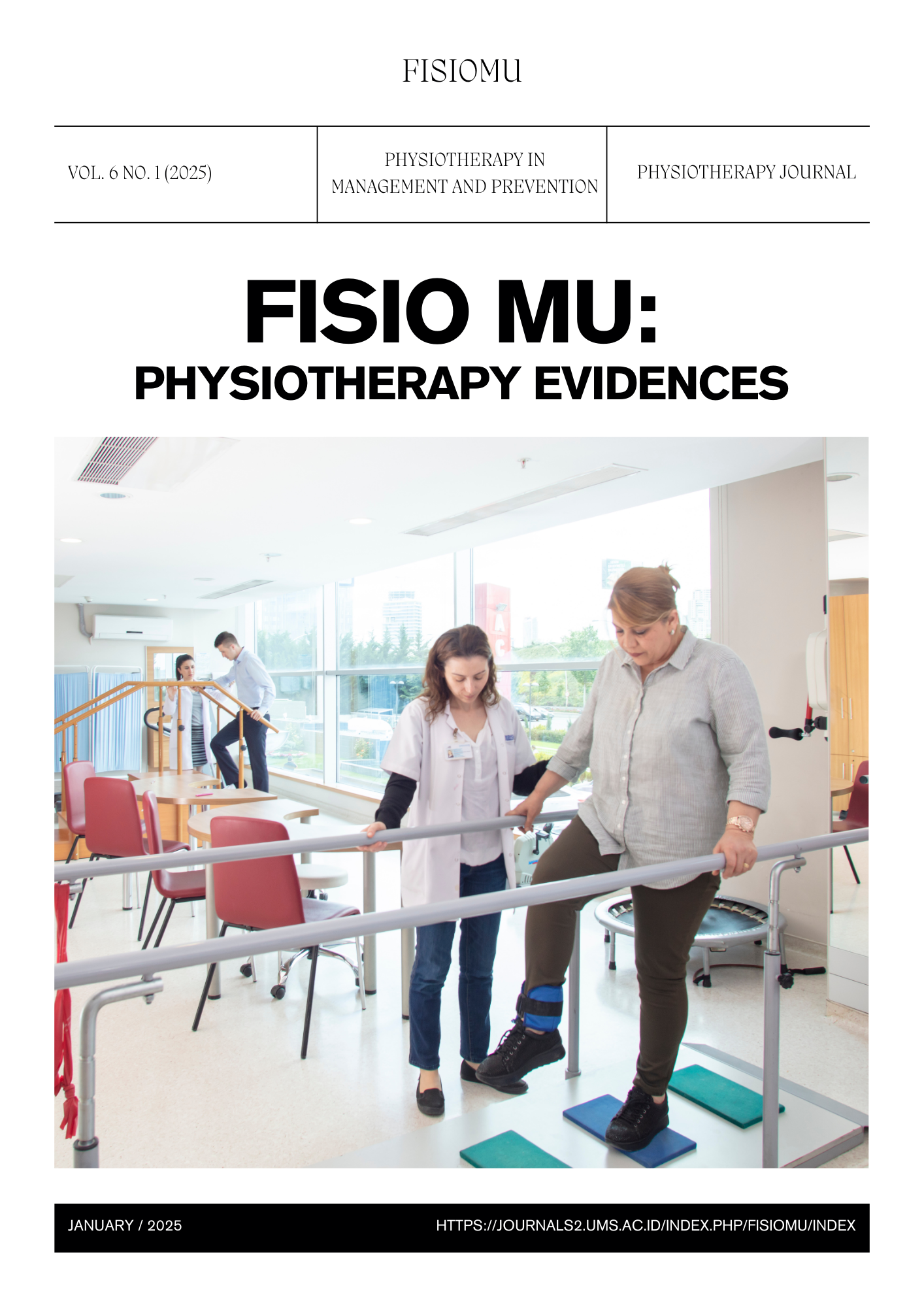The Relationship Between Personality Type and Job Satisfaction of Physiotherapists in the City of Bandung
DOI:
https://doi.org/10.23917/fisiomu.v6i1.5551Abstract
Introduction: Physiotherapists are among the health professionals whose productivity and performance significantly impact job happiness. This study examines the relationship between personality factors and job satisfaction among Bandung's physiotherapists. Methods: Using the Cochran formula, a correlational quantitative technique was used to select a sample of 68 physiotherapists. A modified work satisfaction survey was used to gather data, and personality characteristics were evaluated using the Big Five Inventory (BFI) adaption questionnaire. Results: Regression analysis showed no significant relationship (r = -0.026, p > 0.05) between personality traits and work satisfaction among physiotherapists in Bandung. These findings imply that work happiness is not only determined by personality type. Instead, workload, connections with coworkers, management support, and work environment can be more critical. Conclusion: The results emphasize the necessity of an all-encompassing plan to raise healthcare workers' job satisfaction. Healthcare organizations can improve patient care and results in healthcare settings by implementing focused interventions to boost the well-being and productivity of physiotherapists by recognizing the numerous components that contribute to work satisfaction.
Downloads
References
Abate, H. K., & Mekonnen, C. K. (2021). Job satisfaction and associated factors among health care professionals working in public health facilities in ethiopia: A systematic review. Journal of Multidisciplinary Healthcare, 14, 821–830. https://doi.org/10.2147/JMDH.S300118 DOI: https://doi.org/10.2147/JMDH.S300118
Ali, I. (2019). Personality traits, individual innovativeness and satisfaction with life. Journal of Innovation & Knowledge, 4(1), 38–46. https://doi.org/10.1016/j.jik.2017.11.002 DOI: https://doi.org/10.1016/j.jik.2017.11.002
Angelini, G. (2023). Big five model personality traits and job burnout: a systematic literature review. BMC Psychology, 11(1). https://doi.org/10.1186/s40359-023-01056-y DOI: https://doi.org/10.1186/s40359-023-01056-y
Bernales-Turpo, D., Quispe-Velasquez, R., Flores-Ticona, D., Saintila, J., Ruiz Mamani, P. G., Huancahuire-Vega, S., Morales-García, M., & Morales-García, W. C. (2022). Burnout, Professional Self-Efficacy, and Life Satisfaction as Predictors of Job Performance in Health Care Workers: The Mediating Role of Work Engagement. Journal of Primary Care and Community Health, 13. https://doi.org/10.1177/21501319221101845 DOI: https://doi.org/10.1177/21501319221101845
Bui, H. T. M. (2017). Big five personality traits and job satisfaction: Evidence from a national sample. Journal of General Management, 42(3), 21–30. https://doi.org/10.1177/0306307016687990 DOI: https://doi.org/10.1177/0306307016687990
Dong, J., Xiao, T., Xu, Q., Liang, F., Gu, S., Wang, F., & Huang, J. H. (2022). Anxious Personality Traits: Perspectives from Basic Emotions and Neurotransmitters. Brain Sciences, 12(9), 1–16. https://doi.org/10.3390/brainsci12091141 DOI: https://doi.org/10.3390/brainsci12091141
Heimerl, P., Haid, M., Benedikt, L., & Scholl-Grissemann, U. (2020). Factors Influencing Job Satisfaction in Hospitality Industry. SAGE Open, 10(4). https://doi.org/10.1177/2158244020982998 DOI: https://doi.org/10.1177/2158244020982998
Krijgsheld, M., Tummers, L. G., & Scheepers, F. E. (2022). Job performance in healthcare: a systematic review. BMC Health Services Research, 22(1), 1–17. https://doi.org/10.1186/s12913-021-07357-5 DOI: https://doi.org/10.1186/s12913-021-07357-5
Nirha, A. N., & Chairiyaton. (2021). Pengaruh Karakteristik Individu dan Lingkungan Kerja Terhadap Kinerja Karyawan BPN Aceh Barat. Jurnal Akuntansi, Manajemen Dan Ilmu Ekonomi (Jasmien), 1(03), 6–11. https://doi.org/10.54209/jasmien.v1i03.71 DOI: https://doi.org/10.54209/jasmien.v1i03.71
Pezdek, K., & Dobrowolski, R. (2023). The Ethical Code of Conduct for Physiotherapists—An Axiological Analysis. International Journal of Environmental Research and Public Health, 20(2). https://doi.org/10.3390/ijerph20021362 DOI: https://doi.org/10.3390/ijerph20021362
Puhanić, P., Erić, S., Talapko, J., & Škrlec, I. (2022). Job Satisfaction and Burnout in Croatian Physiotherapists. Healthcare, 10(5), 905. https://doi.org/10.3390/healthcare10050905 DOI: https://doi.org/10.3390/healthcare10050905
Topino, E., Di Fabio, A., Palazzeschi, L., & Gori, A. (2021). Personality traits, workers’ age, and job satisfaction: The moderated effect of conscientiousness. PLoS ONE, 16(7), 1–14. https://doi.org/10.1371/journal.pone.0252275 DOI: https://doi.org/10.1371/journal.pone.0252275
Downloads
Submitted
Accepted
Published
How to Cite
Issue
Section
License
Copyright (c) 2024 Fisio Mu : Physiotherapy Evidaces Journal

This work is licensed under a Creative Commons Attribution-NonCommercial-NoDerivatives 4.0 International License.

This work is licensed under a Creative Commons Attribution-NonCommercial 4.0 International License.
Authors who publish with FISIO MU: Phsiotherapy Evidences agree to the following terms:
- Author(s) retain copyright and grant the journal right of first publication with the work simultaneously licensed under a Creative Commons Attribution-NonCommercial 4.0 International License that allow others to share the work within an acknowledgement of the work’s authorship and initial publication of this journal.
- Author(s) are able to enter into separate, additional contractual arrangement for the non-exclusive distribution of the the journal’s published version of the work (e.g. acknowledgement of its initial publication in this journal).
- Author(s) are permitted and encouraged to post their work online (e.g. in institutional repositories or on their websites) prior to and during the submission process, as it can lead to productive exchanges, as well as earlier and greater citation of published works.












